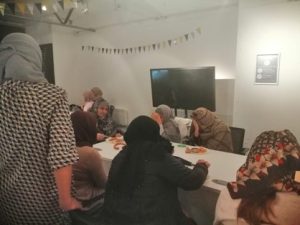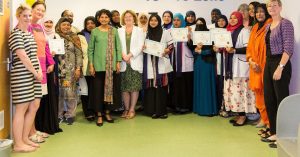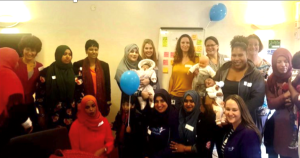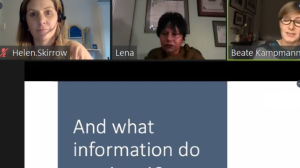- My Imperial Global Development Fellows Fund Placement at Imperial
- Researchers and community members working together to shape research on respiratory infections in young children
- HOPE for Hand Osteoarthritis
- Having an Impact with Public Involvement in Paediatric Intensive Care Research
- Public engagement and involvement at the Cardiomyopathy UK conference: When researchers and the public meet
In conversation with Dr Helen Skirrow, National Institute Health Research Clinical Doctoral Research Fellow, Child Health Unit, Department of Primary Care and Public Health, School of Public Health, Imperial College London. and Lena Choudary-Salter, Founder and CEO of The Mosaic Community Trust
What is “Why has nobody asked us?” about?
“Why has nobody asked us?” aims to explore families’ experiences and perspectives of childhood vaccinations and is a co-production research project between Dr Helen Skirrow and The Mosaic Community Trust. In the UK, children living in poorer areas of big cities like London who belong to ethnic minorities or who do not speak English at home are less likely to be vaccinated however in previous research the voices of these families have often been missing. By undertaking a co-produced public involvement research project, we hope to address this gap in the research and help vaccine services improve so more children get vaccinated.
Who are the Mosaic Community Trust and what do they do?
The Mosaic Community Trust (Mosaic) (a registered charity) was founded in 2005 and supports the local community in and around Church Street, one of the most deprived areas of Westminster in London and very close to Imperial’s St. Mary’s campus. Their mission is to empower diverse, socially and economically marginalised and disadvantaged communities and promote community cohesion and integration. This is achieved through promotion of health and economic wellbeing, community leadership and a rights-based approach to community support. This enables active participation in strategic decision making at the community level and the ability to access mainstream services and economic opportunities.

Mosaic has also trained local women to become community outreach workers/advocates who run biweekly drop-in sessions for local community members to provide mental health and wellbeing support. To facilitate their integral role in the community, Mosaic has also built strong partnerships with local service providers and other voluntary sector organisations. These partnerships enable women to be directed from Mosaic to other support services as well as the ability for local women to be referred by third parties directly to Mosaic sessions.
These strong stakeholder relationships enable Mosaic to act as advocates for the local ethnic minority community. For example, having identified crime and safety as a key concern of the local population, Mosaic conducted a survey of women whom attend their weekly meetings and reported back to local police about the community’s main worries. Following this, local police met with Mosaic and local changes were introduced based on Mosaic’s survey findings.
The support Mosaic provides to the local community goes far beyond their drop-in sessions as you cannot walk down Church Street without Lena Choudary-Salter (the Founder and CEO of Mosaic) asking about someone’s father in hospital or how their recent GP appointment went. More recently, Mosaic has been providing support for women who have arrived from Afghanistan and are staying in local hotels. Mosaic also recently received a prestigious award from the Faith and Belief Forum in recognition of its work in promoting inclusive communities.
How have you co-produced this project together?
The National Institute for Health Research (NIHR) sets out the five key principles of co-production as set out below[1]:
- Sharing of power – the research is jointly owned and people work together to achieve a joint understanding
- Including all perspectives and skills – the research team includes all those who can make a contribution
- Respecting and valuing the knowledge of all those working together on the research – everyone is of equal importance
- Reciprocity – everybody benefits from working together
- Building and maintaining relationships – an emphasis on relationships is key to sharing power. There needs to be joint understanding and consensus and clarity over roles and responsibilities. It is also important to value people and unlock their potential.
We explain below how these principles of co-production relate to our project so far.
1. Sharing of power
When asked why she thought vaccine uptake had always been low in the Church Street area of Westminster, Lena replied “Why has nobody asked us!”. With these words one of Helen Skirrow’s PhD projects was identified and named– why hadn’t the local community been asked their opinion before now? Mosaic and Helen are working together to understand why families think that not enough children are getting vaccinated in North-West London. The phrase “Why has nobody asked us” encapsulates the importance of public involvement and co-production of research. In order to understand why vaccine uptake in an area is low, researchers need to work with, and ask, the local population.

Our co-created research protocol is being submitted for ethics approval within the next month and we will then start data collection with our co-created questionnaire that will be used to understand childhood vaccination access and attitudes of local families to this. Mosaic community health advocates will be acting as co-researchers to deliver the questionnaire which will be available both online and on paper and translated by community health advocates for those who do not understand English.
2. Including all perspectives and skills
After we have used the co-designed questionnaire to understand access and attitudes to vaccines, we will then hold focus groups to explore families’ perspectives on childhood vaccination in more detail. Our findings will help understand how vaccine uptake can be improved for the local population and other ethnically diverse communities living in urban areas. Covid-19 has shown that participatory research with local communities is vital to understand and reduce health inequalities and ensure vaccine uptake is maximised[2].
3. Respecting and valuing the knowledge of all those working together on the research
Before any sessions with community members about our vaccine research take place, Lena, the Mosaic community health advocates and Helen always meet for briefings. This ensures that common terms are agreed and we all have the same understanding of the topic, agree the aims and that any questions from community health advocates have been answered. Mosaic has also been involved in training researchers at Imperial – Lena and Fahmida, (a Mosaic community health advocate) ran a session on how to effectively involve members of the public in research for an ‘away day’ for the Imperial Child Health Unit led by Professor Sonia Saxena, Helen’s primary PhD supervisor.
4. Reciprocity
Mosaic’s community health advocates have attended panels to provide parents’ perspectives including, for example at The Vaccine Centre at The London School of Hygiene and Tropical Medicine.

The community health advocates have all increased their vaccine knowledge, become vaccine advocates and by being part of the research team, learnt skills that are transferable to other professional and personal areas. Training the Mosaic community health advocates on facilitating focus groups is also planned before we undertake the planned focus groups.
5. Building and maintaining relationships
Helen and Mosaic’s relationship started in 2018 when they first worked together to understand and improve pregnancy vaccine uptake as part of the MatImms research team led by Professor Beate Kampmann. You can read more about this in our previous blog.
Helen then attended some of Mosaic’s biweekly drop-in sessions to get to know Mosaic’s community members. The relationship has since continued and included Helen and Professor Kampmann becoming advisors to Mosaic. A meeting between the local public health department, Helen and Mosaic led to the current project “Why has nobody asked us!”.
How has the pandemic impacted the Mosaic Community Trust?

Mosaic works tirelessly, and never more so than throughout the Covid-19 pandemic. They have provided a range of services including assisting the local authority with contact tracing and delivering community support for families who are isolating, such as shopping. A particular focus has been on providing reliable information to the local community about Covid-19 vaccines. Lena and her team recognised immediately that local people had vaccine questions that standard NHS and Public Health England information leaflets were not addressing. Mosaic ran several Covid-19 vaccine question and answer sessions in early 2021 for local people with community health advocates facilitating questions that were answered by a panel made up of local GPs, Imams, Helen and other experts such as Professor Kampmann (head of The Vaccine Centre at the London School of Hygiene and Tropical Medicine). An advantage of already having a strong working relationship, was that it was easier to move all meetings to remote sessions during Covid-19.
As a member of the Central London Clinical Commissioning Group’s Patient Reference Group, Mosaic initiated a co-production communication initiative to promote Covid-19 vaccination. One of the outcomes of this initiative was to produce videos made by GPs targeting patients at their own surgeries which strongly encouraged them to take up the vaccine. This made an impact on the uptake of Covid-19 vaccinations in North Westminster and in the Church Street area in particular, where the Mosaic community health advocates diligently promoted Covid-19 vaccination. Mosaic’s community health advocates have all put in a lot of unpaid hours to support the local community.
What advice would you give researchers interested in co-producing research with, and for the benefit of, communities?
- Invest early in community relationships – it takes time but reaps rewards. Attending community meetings and just listening to people’s views and ideas have all informed research.
- Respect that community group members have busy schedules and demands like everyone else. Plan your sessions to coincide with any community group’s regular meetings – Helen meets with Mosaic on either Mondays and/or Wednesdays when they hold their regular bi-weekly sessions.
- Be aware that if your research project is not a priority for a community then it is unlikely they will want to spend any time on it, so ensure your research is a priority for those whom you are involving.
Any final thoughts?
Together with Mosaic, we are passionate about moving beyond tokenism in public involvement in research and meaningfully involving members of the public whose voices are underrepresented in research. We hope to achieve this by continuing to work together on research on vaccine uptake and beyond……
Dr Helen Skirrow & Lena Choudary-Salter
Helen Skirrow is funded by a National Institute of Health Research (NIHR) doctoral research fellowship (award number NIHR300907 and was previously funded for work with The Mosaic Community Trust by The IMPRINT network IMmunising PRegnant women and INfants neTwork (IMPRINT) which is funded by the UK Research and Innovation-Global Challenges Research Fund Networks in Vaccines Research and Development which was co-funded by the Medical Research Council and Biotechnology and Biological Sciences Research Council.
The original MatImms Research public involvement project on Pregnancy Vaccines was funded by an NIHR Imperial Biomedical Research Centre Patient Involvement Grant.
A note about terminology
The National Institute for Health Research uses the phrase “co-producing research” to mean an approach in which researchers, practitioners and the public work together, sharing power and responsibility from the start to the end of a project, including the generation of knowledge[3]. However, “co-production” has also been defined as being “generally associated with services citizens receive during the implementation phase of the production cycle, whereas co-creation concerns services at a strategic level. In other words, when citizens are involved in the general planning of a service—perhaps even initiating it—then this is co-creation, whereas if they shape the service during later phases of the cycle it is co-production. Input in the design of a service can be both individual or collective, depending on the level at which a service is addressed.” [4]
We consider that this project aligns more with this definition of co-creation as the Mosaic Community Trust was involved in identifying this project and in its planning and implementation, however for the purposes of this blog we are using the term “co-production” as the project is funded by the NIHR. However, members of the Mosaic Community Trust prefer to just say ‘working together’ as co-production and co-creation are not well understood at public meetings!
References:
[1] NIHR Guidance on co-producing a research project April 2021
[2] The COVID-19 vaccines rush: participatory community engagement matters more than ever
[3] NIHR Guidance on co-producing a research project April 2021
[4] Brandsen, Taco, and Marlies Honingh. “Definitions of co-production and co-creation.” Co-Production and Co-Creation. Routledge, 2018.

